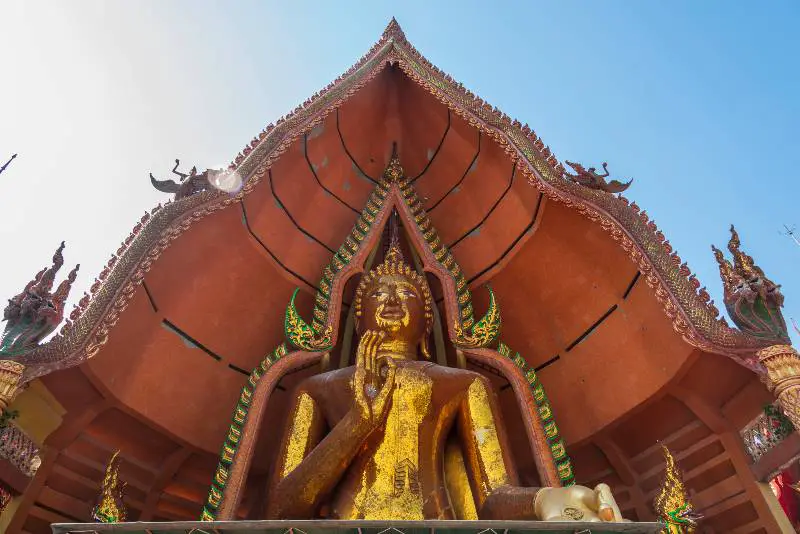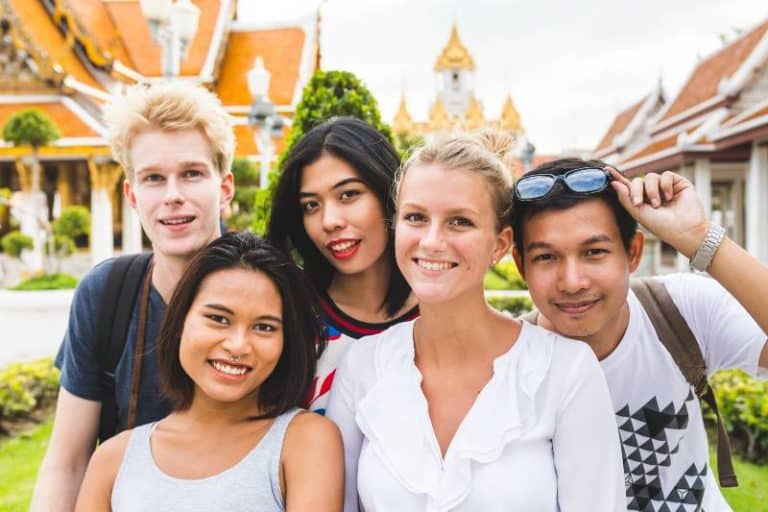Lost in Translation: How To Deal With Culture Shock in Thailand
Are you ready to explore the wonders of Thailand, but feeling a little apprehensive about culture shock? Don’t worry – you’re not alone! Culture shock is a normal part of traveling abroad, and with just a bit of preparation and guidance, you can embrace new cultures comfortably. From language barriers to navigating customs and etiquette differences between your home country and Thailand, this blog post will provide an essential guide for managing culture shock in Thailand so that you can make the most out of your visit. So read on as we share tips on understanding cultural norms, being respectful while traveling in another country, and having amazing experiences without feeling overwhelmed or confused!
One highly effective approach for individuals experiencing culture shock and seeking to improve their understanding of Thai customs is to actively participate in a wide variety of cultural activities. Engaging in local festivals, traditional crafts, and cultural performances provides a unique opportunity to immerse oneself in the rich tapestry of Thai traditions, fostering a deeper appreciation and connection with the local culture.
Key Takeaways
- Before traveling to Thailand, spend time learning about its culture, history, and customs. By gaining an understanding of Thai social norms, language, and traditions, you can better prepare yourself for cultural differences and minimize the impact of culture shock.
- Culture shock can stem from resistance to cultural differences. Embrace these differences as an opportunity to grow and learn. Keeping an open mind and showing respect towards Thai culture can go a long way in enhancing your experience.
- There are numerous resources available to help you adapt to the Thai culture, including books, online platforms, language learning resources, and support groups. Use these tools to navigate the cultural differences and enjoy your time in Thailand.

Understanding Thai Culture
Overview of Thai Culture and Values
Thai culture is a rich tapestry interwoven with values of respect, hierarchy, and harmony, reflecting a captivating blend of ancient customs and modern sensibilities. Thailand, affectionally known as the “Land of Smiles,” offers an amalgamation of traditional and contemporary practices that mirror the nation’s openness to change, without ever losing sight of its heritage.
Respect, a core Thai value, is deeply embedded in every facet of Thai life. This is often represented through the Thai greeting, the “wai,” where hands are clasped together in a prayer-like fashion and a bow is made. The level of the wai often varies depending on the relative status or age of the person being greeted, underlining the significance of hierarchical structures in Thai society.
Family is another cornerstone of Thai culture. Loyalty to one’s family, and the elderly in particular, is highly emphasized. Children are taught from a young age to respect their elders and are expected to look after them in their later years.
Explanation of Key Social Norms and Practices
Thai social norms and practices revolve around the principles of respect, harmony, and the preservation of face. The concept of “face,” akin to reputation or dignity, is taken very seriously in Thai culture. Avoiding direct confrontation and maintaining harmony within social groups is often prioritized to prevent someone from losing face.
For example, public displays of anger or strong emotions are typically frowned upon, as these can disrupt social harmony and potentially cause someone to lose face. Instead, disputes are often dealt with in a calm and non-confrontational manner, and a smile can often be used to de-escalate situations or to mask discomfort or disagreement.
In terms of social hierarchy, seniority is highly respected in Thai culture, whether it’s within families, schools, or workplaces. Younger individuals are expected to show deference to their elders or those in higher positions.
For instance, in a professional setting, junior employees would refrain from openly disagreeing with a senior colleague during a meeting, instead choosing to convey their thoughts in private or through more subtle means.
Moreover, “sanuk,” the idea of deriving fun and enjoyment from activities, is another important part of Thai life. This could be seen in the lively celebrations of festivals like Songkran, or in the general emphasis on friendly, cheerful interactions in daily life.
Understanding the Role of Buddhism in Thai Society
Buddhism, particularly Theravada Buddhism, plays an integral role in shaping Thai society, influencing everything from ethics and daily conduct to arts and architecture. Approximately 95% of Thais are Buddhists, and the principles of Buddhism deeply permeate their daily lives.
The teachings of Buddha, the Four Noble Truths, and the concept of karma form the ethical backbone of Thai society. The belief in karma, the law of moral causation, is particularly influential. For example, Thais believe that good actions lead to positive outcomes, and vice versa for negative actions. This plays a part in fostering a general sense of kindness and politeness in the local community.
Temples, known as “wats,” are found in almost every neighborhood, reinforcing the pervasive influence of Buddhism. These temples not only serve as places of worship, but also as community centers and schools. Many Thai men, regardless of their background, spend some part of their lives as Buddhist monks. This period of monastic living, even if brief, is seen as a rite of passage and an opportunity to gain merit for oneself and one’s family.
Religious festivals such as Visakha Bucha Day, which commemorates the birth, enlightenment, and death of Buddha, are observed nationwide with great reverence. These occasions often involve processions, meditation, and making merit by giving donations or food to monks.
In essence, the Thai way of life beautifully showcases the intricate blend of social norms, traditional practices, and Buddhist principles. Its rich culture and values foster an environment that prizes respect, family, harmony, and spiritual growth, contributing to the unique charm that is distinctively Thai.
Common Instances of Culture Shock in Thailand
Different Aspects of Thai Life That Can Cause Culture Shock
- Respect and Hierarchical Structures: The high level of respect accorded to elders and those in superior positions can often be a significant cultural adjustment for visitors. This respect is seen in everything from the traditional wai greeting to not raising one’s voice to someone older or in a higher position.
- Face Saving: The concept of “saving face” can often be a shock to visitors who are not accustomed to indirect communication. The emphasis on harmony and avoiding public confrontation can sometimes be interpreted as evasive or non-committal to those unfamiliar with this cultural aspect.
- Dress Code: The Thai people have specific dress codes for different places and situations. For example, when visiting temples, it is a must to dress modestly and cover your shoulders and knees. Failure to do so can result in entry denial.
- Noise Levels: Thailand is often a bustling and noisy place, whether in the markets, streets or during the many festivals. For those coming from quieter environments, the constant din can be surprising.
- Cuisine: Thai cuisine is renowned for its robust flavors and spiciness, which can be a shock to unaccustomed palates. Furthermore, the eating of insects as a snack in some areas might seem exotic to many foreigners.
Real-Life Examples or Stories
- An American tourist was initially taken aback when his Thai colleagues did not openly disagree with their boss during a meeting, despite having expressed different viewpoints in private. It took him some time to understand and appreciate the importance of maintaining harmony and saving face in Thai culture.
- A group of European backpackers was surprised and mildly embarrassed when they were not allowed into a popular temple in Bangkok because they were wearing shorts and tank tops. They had to rent appropriate clothing before they could enter the temple.
- An Australian visitor found the sound of tuk-tuks, street vendors, and the constant chatter overwhelming when she first arrived in Bangkok. Over time, she grew accustomed to the noise and even found it to be part of Thailand’s vibrant charm.
- A British expat living in Chiang Mai was initially shocked at the sight of people eating fried insects at a night market. After much persuasion from his Thai friends, he decided to try it and found that it tasted quite similar to fried shrimp.
Culture shock, while initially disorienting, can also be a transformative experience that broadens horizons and deepens understanding of different ways of life. Visitors to Thailand, with time, patience, and a spirit of openness, will often find themselves growing to appreciate and cherish the unique facets of Thai culture that initially surprised them.
Tips on How to Deal with Culture Shock in Thailand
Understanding and Respecting Local Customs
- Educate yourself about Thai customs and cultural norms before your trip to Thailand. Understanding the concept of hierarchy, the importance of respect, and the significance of saving face will help you navigate social interactions more effectively.
- Observe and learn from locals. Pay attention to how they greet each other, their behavior in public spaces, and their overall demeanor. This will give you valuable insights into Thai customs and help you adapt more easily.
Make sure to take the time to read an article that I’ve written about Your Thai Phrasebook: An Expat’s Survival Guide, a comprehensive and indispensable resource for expatriates navigating the intricacies of the Thai language. This guide is specifically designed to help English speakers master useful phrases, key vocabulary, and cultural nuances, allowing them to effortlessly communicate and immerse themselves in the fascinating Thai culture. So, grab your copy today and embark on an exciting linguistic journey!
Learning Basic Thai Language
- Learning a few basic Thai phrases can go a long way in bridging the cultural gap and building rapport with locals. Simple greetings like “Sawasdee” (hello) and “kop khun” (thank you) can make a positive impression and show your respect for the local language and culture.
- Consider taking a Thai language course or using language learning apps to familiarize yourself with common phrases and expressions. This will not only help you communicate but also demonstrate your genuine interest in Thai culture.
Engaging in Cultural Activities
- Participate in local festivals, visit temples, and explore traditional markets. Immersing yourself in Thai cultural activities will provide firsthand experiences and a deeper understanding of the local way of life.
- Try Thai cuisine, attend traditional performances like classical dance or Muay Thai matches, or even participate in a meditation retreat. These activities will allow you to appreciate the richness and diversity of Thai culture.
Make sure to check out an article here, where you can find an extensive list of essential resources for Thai language novices. Whether you’re just starting your journey or looking to fine-tune your grasp of the language, this comprehensive guide is packed with valuable tips and tools to help you navigate the intricacies of Thai language learning. Explore the diverse range of resources included and embark on your language-learning adventure with confidence!
Establishing a Support Network
- Connect with fellow expatriates or locals who have experience living in Thailand. They can offer valuable advice, insights, and support during your adjustment period. Online forums, social media groups, or expat meetups are great avenues to find like-minded individuals.
- Make an effort to build relationships with Thai people, both locals and colleagues. Developing friendships and social connections will not only help you navigate cultural differences but also provide a support network in times of need.
Taking Care of Mental Health
- Culture shock can sometimes lead to feelings of isolation, frustration, or homesickness. It is crucial to prioritize your mental well-being during this period.
- Stay connected with friends and family back home through video calls or messaging apps. Sharing your experiences and seeking their support can alleviate feelings of homesickness.
- Engage in activities that bring you comfort and joy, such as exercising, practicing mindfulness, or pursuing hobbies. Taking care of your mental health will enable you to adapt and thrive in your new cultural environment.
The Adjustment and Biculturalism Stage, the final stage of the journey, may prove elusive for some, yet the pursuit of total assimilation with their adopted country continues. During this independence stage, immigrants strive to master the local tongue, embrace genuine friendships (rather than those formed for monetary gain), and achieve a deep sense of comfort and adeptness in their new environment.
Remember, experiencing culture shock is a natural part of the adjustment process when immersing yourself in a new culture. By approaching it with an open mind, curiosity, and respect, you can embrace the challenges and rewards of living in Thailand, leading to a more enriching and fulfilling experience.

How To Deal With Culture Shock In Thailand FAQs
How can I effectively deal with culture shock in Thailand?
The most effective way to deal with culture shock in Thailand is to educate yourself about Thai customs and cultural norms before your trip, observe and learn from locals, learn some basic Thai language, engage in cultural activities such as attending festivals and visiting temples, establish a support network of expatriates or locals who have experience living in Thailand.
What resources are available to help me understand Thai culture better?
There are many resources available to help you understand Thai culture better. Online forums, social media groups, and expat meetups are great avenues to find like-minded individuals who can offer valuable advice. You can also consider taking a Thai language course or using language learning apps to familiarize yourself with common phrases and expressions.
How does language play a role in culture shock in Thailand?
Language plays a significant role in culture shock in Thailand. Learning some basic Thai phrases can help bridge the cultural gap and build rapport with Thai locals. Simple greetings like “sawasdee” (hello) and “kop khun” (thank you), as well as being able to communicate needs or ask for directions, will make it much easier to navigate social interactions and get around.
What are some specific strategies to overcome culture shock?
Some specific strategies to overcome culture shock include understanding and respecting local customs, learning the basic Thai language, engaging in cultural activities, establishing a support network, and taking care of mental health. It is also important to approach culture shock with an open mind, curiosity, and respect to embrace the challenges and rewards of living in Thailand.
How can embracing Thai culture help me deal with culture shock?
Embracing Thai culture can help you in overcoming culture shock by allowing you to appreciate the richness and diversity of Thai culture. Participating in local festivals, visiting temples, trying traditional cuisine, attending performances like classical dance or Muay Thai matches, or even participating in a meditation retreat will enable you to gain firsthand experiences and a deeper understanding of the local way of life.
Conclusion
All in all, a trip to Thailand can be the experience of a lifetime. With its vibrant culture and breathtaking scenery, there’s something for everyone to enjoy during their stay. However, cultural differences can present a real challenge while acclimating upon arrival. To mitigate the effects of culture shock, it’s important to get acquainted with Thai customs and etiquette before visiting.
Get to know the language, prepare yourself mentally for the journey ahead, and be ready to embrace the diverse experiences you’ll encounter! There is also plenty of online resources that can help you properly navigate cultural differences while vacationing in Thailand. Don’t miss out on our newsletter for tips on living abroad in Thailand or subscribe to our blog for more posts on life abroad. Bon voyage!






